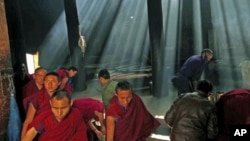As a wave of self-immolations continues in Tibetan areas of China, Chinese authorities not only are tightening security, but also are stepping up efforts to discredit those who have set themselves on fire to protest China's policies in the region.
Chinese authorities held press conferences Wednesday on the sidelines of a major political gathering in Beijing to emphasize the government’s point of view and its argument that overseas groups and Tibet’s exiled spiritual leader, the Dalai Lama, are orchestrating the unrest.
Chinese officials held two briefings on the sidelines of the annual National People's Congress about the situation.
Growing wave of protests
At least 25 nuns, monks and other people have set themselves on fire in Tibetan areas since last March, and the wave of protests shows few signs of abating.
On Monday, an 18-year old identified as Dorjee set himself ablaze and walked from a bridge to a Chinese office building in Sichuan province's Aba prefecture. Before succumbing to the flames, he shouted slogans against the Chinese government. Two others have set themselves on fire since last Saturday.
China has said little about the link to government policies in Tibetan areas, which activists say is a key motivator behind the protests.
On Wednesday, Wu Zegang, an ethnic-Tibetan and head of Aba prefecture - where most of the recent self-immolations have taken place - blamed separatists for the unrest.
Wu said that most of the people who are carrying out acts of self-immolation shout out separatist slogans such as "Independence for Tibet" or aim to divide China.
He also said that many of those who have committed suicide have criminal records and are outcasts.
Isolating a region
Although some foreign media organizations have managed to send out video from Tibetan areas, showing increased security, the region is mostly off-limits to journalists, making it difficult to verify reports of self-immolations or better understand why they are happening.
On Wednesday, China's state media confirmed the death of Tsering Kyi late last week, saying her decision to set herself on fire might have been the result of a head injury she allegedly sustained in school. Tibetan activists disagree.
"We know that a few days before she self-immolated, she had actually been at her family home, which is a few hours away from where she attended school. And she had been with her family, and her family described her as being very well and happy. She had been talking to friends and family in the local area. No one had expressed any concern about her well being," said Stephanie Brigden, with the London-based organization Free Tibet.
Brigden said local Chinese leaders are under immense pressure to maintain order ahead of an expected political succession in China later this year, and that the situation in Tibet is raising domestic and international concerns.
"These statements, including Wu Zegang's statement, are really part of China's propaganda to deflect internal, as well as the external, criticism that they are now facing in the face of increased numbers of self-immolations," said Brigden.
Chinese authorities used Wednesday's press conferences to highlight the funds and efforts they have put into developing Tibetan areas and to assure reporters that the region is largely stable. But analysts and Tibetan activists caution that the situation could quickly spiral out of control.
News
China Downplays Impact of Tibetan Self-Immolations
- By Bill Ide




